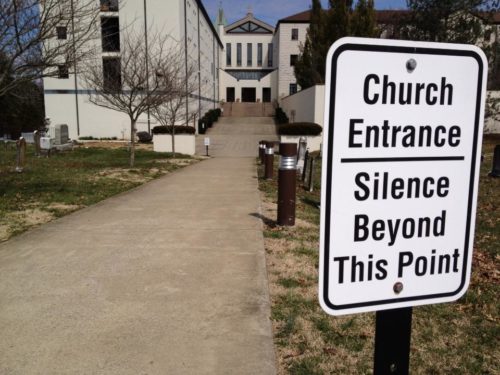 I remember the first monastic retreat I experienced many years ago. It was at the Trappist monastery – Our Lady of Gethsemani in central Kentucky – and my friend Steve and I decided we would do it right.
I remember the first monastic retreat I experienced many years ago. It was at the Trappist monastery – Our Lady of Gethsemani in central Kentucky – and my friend Steve and I decided we would do it right.
No acting like tourists. No special treatment. We would go on “monk time” for the duration of our silent, four-day retreat on the grounds where Thomas Merton once lived and is now buried.
We were very gung-ho. And then the alarm rang at 3 a.m.
The bells were ringing. We had 15 minutes to roll out of bed, wipe the sleep from our eyes, shake our brains and make our way to the main church for the Liturgy of the Hours.
More than 60 monks chanted from side to side. We sat above in the balcony, trying to keep up with the printed materials in a church that had very little light.
The chanting gave way to prayers and then to readings and reflections. God’s word set to the monastic chants filled our hearts for the next hour and set the stage for what would be a day of prayer, liturgy, reflection and more chants than a “secular” man had ever heard.
Each day of the retreat, the 3 a.m. bells were easier to respond to. We developed a habit, based on the rules of the monks.
Rules that were derived from the man we honor today in the Church, St. Benedict, who wrote the original “handbook” for monasticism, which became the basis for both Benedictine and Cistercian monasteries, primarily in the West. The Cistercians are the order under which the Trappist monks live out their lives.
And when you reflect on our world today, you have to believe that there was quite a bit of wisdom in St. Benedict’s rules – not just for monks, but for each of us.
I might add, ESPECIALLY those of us who live in the secular world.
St. Benedict wrote rules that called for a balance of prayer, work and study. Let those three things soak into your head: Prayer. Work. Study.
Prayer. Work. Study.
Those 3:15 a.m. chants are the way the Trappist monks express their prayer … the first of seven such prayer sessions each day of the week.
But even though Steve and I probably felt the urge to go back to sleep by 4:30 a.m., the monks would use that time in the wee hours of the morning to study. They would read reflections of the readings. They would read scripture. They might listen to lectures.
How long has it been since you got up before dawn in order to read scripture?
After the morning prayers and then daily Mass and breakfast, the monks immerse themselves into their work lives. In this case, it involved running a successful cheese and fudge business. Other monasteries across the globe produce products that range from beer to wine, rocking chairs to coffins.
Throughout the typical day of a monk, the usual chores are interrupted by more bells and more chants.
That is probably not the best way to phrase that. Let’s try again … Throughout the day, the usual chants and prayers are interrupted by the daily work schedule.
You see … the monks are all about balance, indeed, but the prayer life comes first.
Again … prayer comes first.
Where does prayer, work and study fit into our lives?
I will be the first to admit that I don’t do enough. With my business, my family and many other things happening in a busy life, I often find it difficult to carve out the time needed for prayer and study.
But I try. I always try.
I know that prayer and meditation, frequent study of scripture and the lives of the saints, are the keys to keeping balance in a crazy life.
I know that weekly attendance at Mass is not enough. See today’s first reading!
Going through “the motions” of being a faithful Catholic will not get the job done. Instead, “the motions” are meant to be the tools we use to draw ourselves closer to Christ.
We should not strive for others to see us kneeling and praying to Jesus on the cross.
We should strive for others to look at us and “see” Jesus in the way we live our lives.
If God took a “selfie” … would the image look like you?
St. Benedict understood that human beings are complicated and the world can be an ugly, troubling place to live out our lives and work on our salvation. That’s why he left the city and lived in a cave.
Thanks to him – and all of the Desert Fathers of the early church – we don’t need to live in a cave.
We just need to live a life in balance.
Prayer. Work. Study.
Make sure you have all three in your calendar … and never stop trying to keep them in the proper order.
